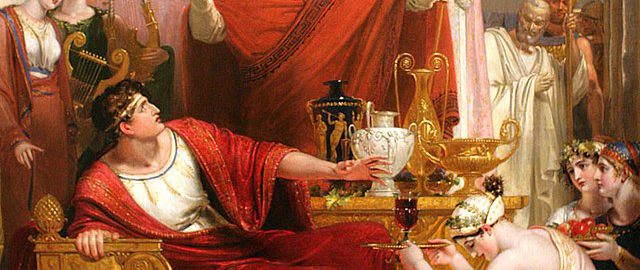Dionysius, tyrant of Syracuse, was madly addicted to poetry1. Unfortunately, his graphomania was reaching its heights, rising above the waves of opinion as the worst human being, ie the flatterers. In a moment of peace, the tyrant devoted himself completely to writing poetry, gathering around him many teachers and even critical commentators.
Luckily, the tyrant was visited by the poet Philoxenus of Cythera, the famous maker of dithyrambs. It was then that the tireless work of Dionysius clashed with the real, sincere and… persistent criticism of an expert on the subject. According to Diodorus Siculus’ account, the event took the following course:
After dinner, when the compositions of the tyrant, which were wretched, had been read, he was asked what was his judgement of the poetry. When he replied with a good deal of frankness, the tyrant, offended at his words, found fault with him that he had been moved by jealousy to use scurrilous language and commanded his servants to drag him off forthwith to the quarries. On the next day, however, when Philoxenus’ friends made petition for a grant of pardon, Dionysius made up with him and again included the same men in his company after dinner. As the drinking advanced, again Dionysius boasted of the poetry he had written, recited some lines which he considered to be happily composed, and then asked, “What do you think of the verses?” To this Philoxenus said not a word, but called Dionysius’ servants and ordered them to take him away to the quarries. Now at the time Dionysius, smiling at the ready wit of the words, tolerated the freedom of speech, since the joke took the edge off the censure. But when some time later his acquaintances and Dionysius as well asked him to desist from his untimely frankness, Philoxenus made a paradoxical offer. He would, he said, in his answer both respect the truth and keep the favour of Dionysius. Nor did he fail to make his word good. For when the tyrant produced some lines that described harrowing events, and asked, “How do the verses strike you?”, he replied, “Pitiful!”, keeping his double promise by the ambiguity. For Dionysius took the word “pitiful” as signifying harrowing and deeply moving, which are successful effects of good poets, and therefore rated him as having approved them; the rest, however, who caught the real meaning, conceived that the word “pitiful” was only employed to suggest failure.2.


